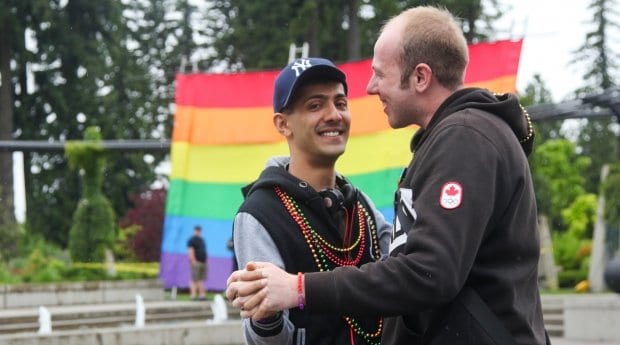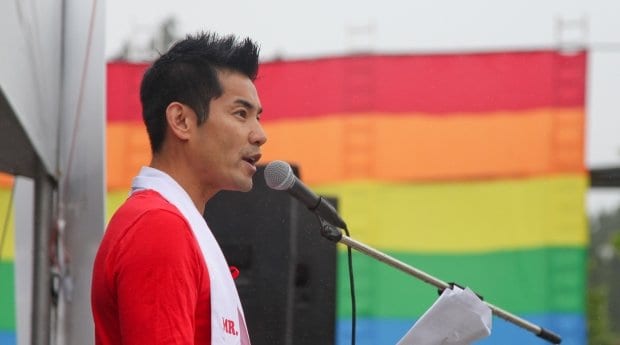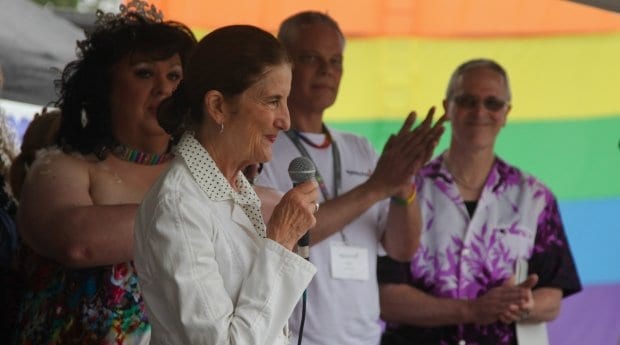
Brad and Adam dance to a live band at Surrey Pride in Holland Park, July 6. Credit: David P Ball

Christepher Wee, Mr Gay Canada 2014, doesn’t buy Surrey’s three-flagpole excuse. “I don’t understand why our provincial government in Victoria can fly our flag, but there’s a problem here in Surrey,” he says. Credit: David P Ball
Despite disappointment with Surrey city council’s refusal to raise the rainbow flag again this year, Pride organizers say a strong showing by city officials at the July 6 festival in Holland Park is a sign of positive things to come.
“It was good to see their turnout,” Surrey Pride Society vice-president Shawn Ewing tells Xtra. “They’re certainly willing to have conversations, not only about the flag issue, but about the festival itself and helping to grow it. Out of the controversy of the flag has come some new ground to work with.”
The city’s ongoing reluctance to raise the rainbow flag was mentioned in many of this year’s speeches from the stage in Holland Park, although many speakers also acknowledged the city’s Pride Week proclamation and its financial support.
City councillors say their hands are tied by official flag protocols, which dictate that civic, provincial and federal flags be flown. With only three flagpoles outside the newly constructed city hall, there’s no space for community flags, they say.
“We did not vote against flying the Pride flag. That’s been misreported a number of times,” Councillor and Acting Mayor Judy Villeneuve tells Xtra. “We did a lot of research on flag policy and what has been our policy . . . But I appreciate the Pride organizers bringing to our attention the fact that different communities would like to have a flagpole actually outside city hall. We’ll move in that direction. It would be lovely to have a community pole.”
In his recent travels to Canadian cities of various sizes, Mr Gay Canada says, he’s learned that other communities have had no such problems with protocol. “There’s always a solution,” Christepher Wee tells Xtra. “The three-flagpole excuse is just an excuse.”
“I don’t understand why our provincial government in Victoria can fly our flag, but there’s a problem here in Surrey,” he adds.
Wee suggests either having corporate sponsors donate funds toward a new, fourth flagpole for community events or raising the rainbow on the same pole as the current City of Surrey flag.
In his speech at Surrey Pride, he questioned whether city council had a “true understanding of the significance of raising our rainbow flag.” The flag is a “reflection of our struggles, remembrance of our sacrifice and losses, celebration of our victories, education and enlightenment of the causes we strive to see realized,” he said to audience applause.
“Even after celebrating 15 years of Pride here in Surrey,” he added, “the city’s unwillingness to raise our flag goes to show that even in our own home . . . we still have a long, long, long way to go.”
Villeneuve takes issue with that characterization, saying the City of Surrey is “very open” to diversity and supports the LGBT community.
“People should celebrate their sexuality and be able to be who they are as strong individuals,” she says. “People have a right to find themselves in this world and to be safe in contributing who they are.
“We are a very diverse community, and education is part of developing understanding about peoples’ differences,” she continues. “I think prejudice is built on people’s lack of knowledge of who people are.”
Ewing says Surrey’s leaders need to understand why the flag is important as a symbol. “It’s a visual to know that you’re not alone and that there’s love and comfort there,” she says. “We’re really hopeful moving forward we can maintain a positive relationship.
“That doesn’t mean we’re not going to push,” she adds. “We’re not going to roll over.”

 Why you can trust Xtra
Why you can trust Xtra


